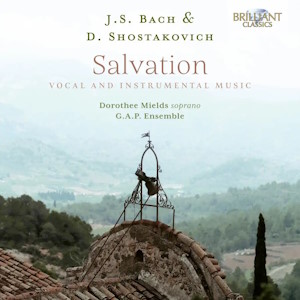
Salvation
Dorothee Mields (soprano)
G.A.P. Ensemble
rec. 2023, Auditori Josep Carreras, Vila-seca, Tarragona, Spain
Brilliant Classics 97280 [79]
The theme of this album is interesting, if unlikely at first glance. “Salvation” was certainly a paramount concern for the steadfastly Christian Johann Sebastian Bach—but for the avowedly atheist Dmitri Shostakovich? Both composers share a number of commonalities, not least of which is their penchant for vocal music. In the latter’s final years there is also a tantalizing suggestion of interest in the imagery and sociological apparatus of things Christological. His improbable enthusiasm for Andrew Lloyd Webber’s iconoclastic Jesus Christ Superstar comes to mind. More telling is the discernible influence of Russian Orthodox liturgical music in Shostakovich’s lamentably ignored 1970 male choral cycle, Loyalty, a haunting work perched between the Third World and the next.
A shame, then, that these intriguing parallels are not better explored in this Brilliant Classics release. Arias and recitatives from Bach’s cantatas are erratically tossed in with Shostakovich’s student Piano Trio No. 1 and his late Seven Romances on Poems by Alexander Blok, garnished with a prelude and fugue from each composer. What Luca Quintavalle, who does double duty here on keyboards and liner notes, calls their shared “deep sense of the sacred as the only consolation for the sufferings of life” would have been more imaginatively, not to mention more provocatively illustrated with different choices of Shostakovich works. Maybe an arrangement of “A Walk into the Future” from Song of the Forests or the “Vocalise” from the film score for The Fall of Berlin—both works being secular evocations of Sunday morning prayers and amens.
If this album’s concept is imperfectly realized, its performances at least are satisfying and worth hearing. The thread tying the whole is soprano Dorothee Mields, whose plummy voice navigates the expressive intricacies of Bach and Shostakovich with unobtrusive astuteness. Her approach, emphasizing evenness of sound over histrionics, is particularly welcome in the Seven Romances on Poems by Alexander Blok; wherein she adroitly reveals those pockets of beauty, severe and breathtaking, that occasionally illuminate the penumbral landscape of late Shostakovich.
Mields’ performances of excerpts of Bach cantatas are just as lovely—unsurprising given her Baroque music background. Their message is conveyed without the pettifoggery of exaggerated word painting, making manifest her trust in their texts and, by extension, the music. Likewise her tasteful application of vibrato, which makes an attractive foil to the more steadfast period playing of her GAP Ensemble partners: violinist Emilio Pecan, cellist Oriol Aymat Fusté, and keyboardist Quintavalle.
They take the proverbial stage on their own in a lively reading of Shostakovich’s Piano Trio No. 1, which swoons and sings with plenty of silent film-era sentiment.
It was while listening to Quintavalle’s period organ in the Bach cantatas, however, that I was reminded of another interest that Shostakovich developed near the end of his life: in the music of John Eaton and the possibilities of Moog synthesizers. Whether or not he would have produced something creative from this – and how – is one of the bizarro question marks that punctuate the final pages of his biography.
Maybe this album’s concept is better accomplished than I initially thought.
Néstor Castiglione
Help us financially by purchasing from


Contents
Johann Sebastian Bach (1685–1750)
Sonata for violin and continuo in G major, BWV 1021 (1732–1733)
“Ich bin in mir vergnügt” from Ich bin in mir vergnügt, BWV 204 (1726–1727)
“Ich bin vergnügt in meinem Leiden” from Ach Gott, wie manches Herzeleid, BWV 58 (ca. 1727)
Prelude and Fugue in D minor from The Well-Tempered Clavier (Book 2), BWV 875 (1742)
“Welt, deine Lust ist Last” from Komm, du süße Todesstunde, BWV 161 (1716)
“Komm in mein Herzenshaus” from Ein feste Burg ist unser Gott, BWV 80 (ca. 1728)
“Du süßer Jesus-Name du” and “Jesus soll mein erstes Wort” from Gott, wie dein Name, so ist auch dein Ruhm, BWV 171 (ca. 1729)
“So glaubt man denn, dass die Musik verführe” from O holder Tag, erwünschte Zeit, BWV 210 (ca. 1738)
“Leit, o Gott, durch deine Liebe” from Herr Gott, Beherrscher aller Dinge, BWV 120a (ca. 1729)
Dmitri Shostakovich (1906–1975)
Piano Trio No. 1, Op 8 (1924)
Prelude and Fugue No. 5 in D major from the 24 Preludes and Fugues, Op. 87 (1950–1951)
Seven Romances on Poems by Alexander Blok, Op. 127 (1967)

















